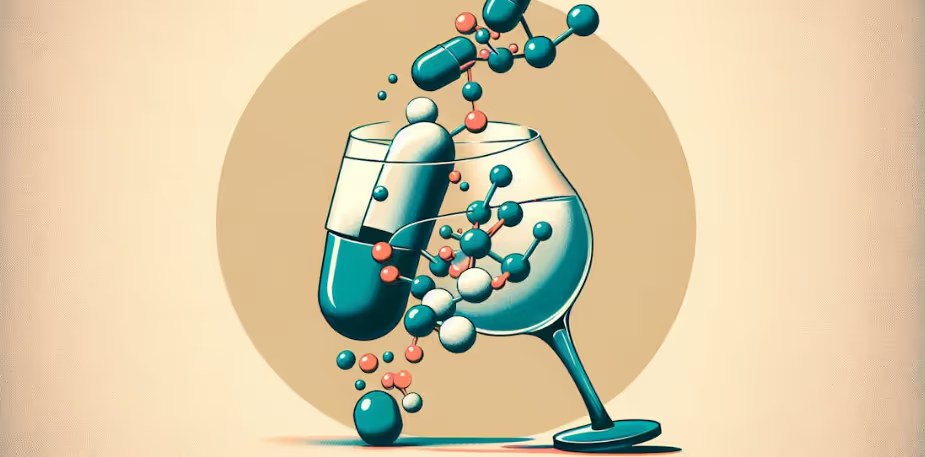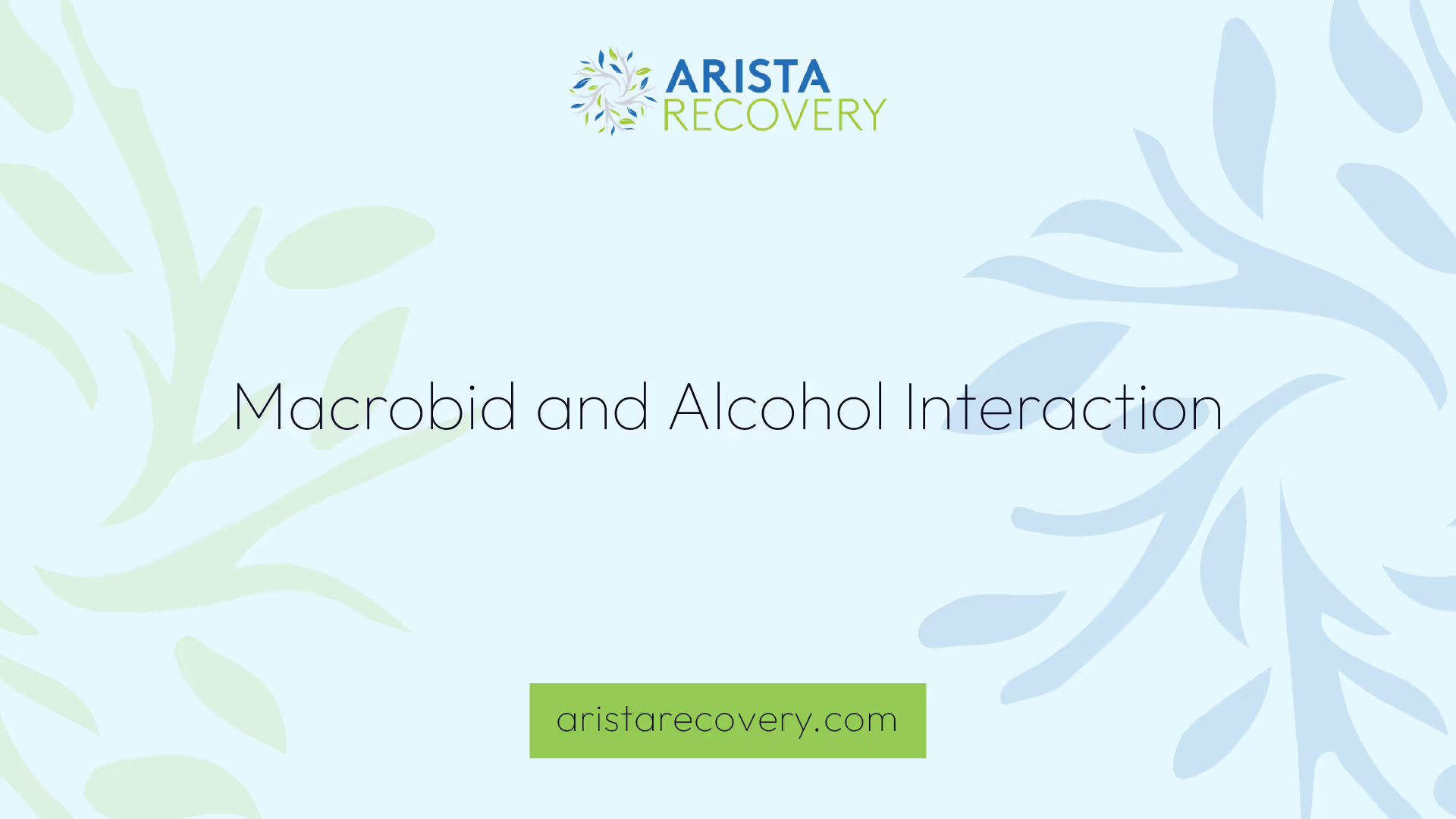Macrobid and Alcohol Interaction

Understanding Macrobid
To gain a comprehensive understanding of the interaction between Macrobid and alcohol, it's crucial to first understand what Macrobid is and what it's used for.

What is Macrobid?
Macrobid, also known as Nitrofurantoin, is an antibiotic commonly utilized for the treatment of urinary tract infections (UTIs). It functions by inhibiting the growth of bacteria in the urinary tract, thereby helping to clear the infection. It's important to note that Macrobid is effective against certain types of bacteria, and its use is generally limited to treating infections caused by these specific bacteria [1].
Uses of Macrobid
The primary use of Macrobid is to treat urinary tract infections, which can affect various parts of the urinary tract, including the bladder, urethra, or kidneys. These infections are typically caused by bacteria, and antibiotics like Macrobid are effective in treating them.
In addition to its primary use, Macrobid may also be used in some cases for prevention. For example, it may be prescribed to individuals who are at a higher risk of recurrent UTIs. Regardless of the reason for its use, it's crucial to follow the doctor's instructions carefully when taking this medication to ensure its effectiveness and minimize potential side effects.
While taking Macrobid, it may be recommended to make certain lifestyle changes, such as avoiding alcohol, to assist in easing symptoms of UTIs and enhancing the effectiveness of the treatment. This is why it's essential to understand the potential interaction between Macrobid and alcohol, which we will delve into in the following sections.
Interaction of Macrobid and Alcohol
Understanding the interaction between Macrobid and alcohol is crucial for those taking this medication. While there are no known direct interactions, the combined effects on the body can lead to potential complications.
Direct Interactions
According to the Mayo Clinic, Macrobid has no known interactions with alcohol. Therefore, it is generally safe to drink moderate amounts of alcohol while taking Macrobid. However, Niagara Recovery suggests that it is generally recommended to avoid drinking alcohol while taking this medication.
While there is no direct interaction between the two substances, combining Macrobid and alcohol can place additional stress on the liver, potentially interfering with its ability to properly metabolize both substances. This could lead to complications with liver function, especially if either substance is consumed in large amounts.
Potential Side Effects
One of the main concerns with combining Macrobid and alcohol is the potential for increased side effects. Alcohol can interfere with the effectiveness of Macrobid and may increase the risk of experiencing side effects. These can range from mild symptoms such as nausea and dizziness to more severe complications such as liver damage.
Furthermore, alcohol weakens the immune system, making it harder for the body to fight off infections. When taking Macrobid, it is important to have a strong immune system for the antibiotic to work effectively. Therefore, those taking Macrobid should consider limiting their alcohol intake to maintain a strong immune response and optimize the effectiveness of the medication.
In conclusion, while there are no known direct interactions between Macrobid and alcohol, the combined effects on the liver and immune system could lead to potential complications. Therefore, it is generally recommended to limit or avoid alcohol consumption while taking Macrobid. Always consult with a healthcare provider for personalized advice on medication and alcohol consumption.
Risks of Combining Macrobid and Alcohol
Even though Macrobid has no known direct interactions with alcohol, and it's generally safe to drink moderate amounts of alcohol while taking Macrobid. Mixing Macrobid and alcohol can present certain risks, including impacts on the liver and the immune system.
Impact on Liver
Macrobid and alcohol, when consumed simultaneously, can place an additional burden on the liver. This organ is responsible for metabolizing both substances. Introducing alcohol into the system while taking Macrobid can potentially interfere with the liver's ability to properly metabolize these substances [3].
This added strain can exacerbate any existing liver conditions and may lead to liver damage over time. It's also important to remember that the liver's ability to metabolize substances influences how effectively medications work and how quickly they are eliminated from the body.
Effect on Immune System
Alcohol can also interfere with the effectiveness of Macrobid and may increase the risk of experiencing side effects. This is largely due to alcohol's tendency to weaken the immune system, making it harder for the body to fight off infections.
When taking Macrobid, it is especially important to have a strong immune system. This antibiotic needs to work in conjunction with the immune system to effectively fight off bacterial infections. Consuming alcohol while on Macrobid can hamper the immune system's ability to do its job effectively, potentially reducing the effectiveness of the antibiotic.
In conclusion, while there are no known direct interactions between Macrobid and alcohol, it is generally wise to avoid or limit alcohol consumption while taking this medication to protect your liver and ensure the effectiveness of the antibiotic. Always consult with a healthcare professional if you have any concerns about the macrobid and alcohol interaction.
Guidance on Alcohol Consumption with Macrobid
While understanding the interaction between Macrobid and alcohol is crucial, so too is the guidance on how to manage alcohol consumption while on this medication.
Recommendations from Health Professionals
Despite Macrobid having no known direct interactions with alcohol, it is generally recommended by health professionals to avoid drinking alcohol while taking this medication. This is primarily because alcohol can interfere with the effectiveness of Macrobid and may increase the risk of experiencing side effects [4].
Moreover, combining Macrobid and alcohol may cause a disulfiram-like reaction, which includes symptoms such as flushing, headache, nausea, and vomiting. This reaction could occur within 10 minutes to 2 hours after consuming alcohol [1].
The risks associated with mixing Macrobid and alcohol highlight the importance of strictly following the prescribed treatment regimen and avoiding alcohol consumption to prevent potential adverse effects and ensure the effectiveness of the medication.
Individual Factors to Consider
While general recommendations suggest avoiding alcohol while taking Macrobid, individual factors can greatly influence this guidance. For instance, the effects of Macrobid can be intensified by alcohol, leading to an increased risk of liver damage. This is particularly relevant for individuals with pre-existing liver conditions, who should seek medical advice before consuming alcohol while on this medication.
Moreover, interactions between Macrobid and alcohol can cause dizziness, drowsiness, and confusion, affecting the ability to perform tasks that require alertness. This can be especially hazardous when driving or operating machinery.
To prevent harmful interactions, it is recommended to refrain from drinking alcohol for the duration of the Macrobid treatment, including during the course and for a few days following the completion of the prescribed medication to ensure optimum safety and effectiveness in combating the infection.
In conclusion, while the decision to consume alcohol while taking Macrobid is ultimately a personal one, it should be made with full awareness of the potential risks and side effects. Always consult with a healthcare professional for personalized advice based on your specific health circumstances and the nature of the medication you are taking.
Alternatives to Alcohol During Treatment
While undergoing treatment with Macrobid, it's crucial to consider alternatives to alcohol. This is due to possible interactions between Macrobid and alcohol that can potentially reduce the effectiveness of the medication and exacerbate side effects. Here, we'll discuss non-alcoholic beverage options and lifestyle changes that can aid in the treatment process and promote better health.
Non-alcoholic Beverage Options
The most advisable course of action while taking Macrobid is to reduce or avoid alcohol intake. This measure can potentially lessen side effects such as nausea or dizziness, and ensures the medication can work effectively in treating the urinary tract infection [2].
Instead of alcohol, individuals can opt for a variety of non-alcoholic beverages like:
- Water: Staying hydrated can help flush out the bacteria causing the infection.
- Herbal tea: These can have soothing effects and are generally free of caffeine.
- Fruit juice: A healthy source of vitamins, but be cautious of the sugar content.
- Non-alcoholic beers and wines: These can be a viable option for social situations.
Lifestyle Changes for Better Health
Beyond beverage choices, certain lifestyle changes can also contribute to easing symptoms of urinary tract infections and promoting overall well-being. Here are some recommended changes:
- Avoid alcohol: As previously mentioned, alcohol can potentially interfere with the body's ability to metabolize drugs like Macrobid, reducing the efficacy of the treatment.
- Healthy diet: A balanced diet rich in fruits, vegetables, lean proteins, and whole grains can support your immune system and overall health.
- Regular exercise: Physical activity can boost your immune system, helping your body fight off infections.
- Adequate rest: Rest allows your body to recover and strengthens your immune system.
- Hygiene: Proper hygiene can prevent bacteria from entering the urinary tract and causing infections.
In all cases, it's important to remember that each individual's circumstances are unique. Therefore, it's advisable to consult with a healthcare provider before making any significant changes to your diet or lifestyle, especially when undergoing treatment with medications like Macrobid [6]. This ensures personalized recommendations based on your circumstances, medical history, and specific medication dosages, promoting safety and well-being.
References
[1]: https://www.webmd.com/drugs/2/drug-14376/macrobid-oral/details
[2]: https://www.prescriptiondoctor.com/cystitis/nitrofurantoin/nitrofurantoin-and-alcohol
[3]: https://www.niagararecovery.com/blog/macrobid-and-alcohol/
[4]: https://www.mayoclinic.org/drugs-supplements/nitrofurantoin-oral-route/side-effects/drg-20065102
[5]: https://www.primroselodge.com/help-guides/nitrofurantoin-and-alcohol/
[6]: https://www.townsendla.com/blog/mixing-nitrofurantoin-and-alcohol
You’re not alone in this.
When mental health challenges and addiction intersect, it can feel isolating. At Arista, we offer compassionate, evidence-based, and trauma-informed care to help you heal, grow, and move forward.
You’re not alone in this.
When mental health challenges and addiction intersect, it can feel isolating. At Arista, we offer compassionate, evidence-based, and trauma-informed care to help you heal, grow, and move forward.
Support that moves with you.
You’ve taken a brave first step. At Arista Recovery, we’re here to help you continue with best-in-class care designed for long-term healing and support.
.webp)






